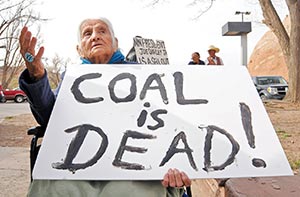Protestors air complaints about Peabody
Black Mesa riders, supporters pepper delegate with hard questions
By Marley Shebala
Navajo Times
WINDOW ROCK, April 26, 2010


(Times photo - Leigh T. Jimmie)
ABOVE: Katherine Smith, 95, of Big Mountain, Ariz., joins a protest against the Peabody coal-mining lease April 19 at the Navajo Nation Council Chamber.
BELOW: Horseback riders, some of whom rode all the way from Pinon, Ariz., arrive at the Navajo Nation Council Chamber on the first day of the spring session on April 19.
For the past 40 years, residents of Black Mesa, Ariz., have walked, driven and ridden on horseback to Window Rock to meet with their leaders.
On April 19, the first day of the Navajo Nation Council's spring session, a group walked to the council chambers carrying signs protesting the renewal of Peabody Western Coal Co.'s lease on Black Mesa.
Among the group were eight horseback riders who had ridden for three days from Big Mountain and Piñon, Ariz., to the capital.
Outside the council chamber, they met informally with delegates including George Arthur (Nenahnezad/San Juan/T'iistsoh Sikaad), the sponsor of a resolution to renew Peabody's lease.
Arthur chairs the council's Resources Committee, which is supporting the lease renewal with no increase in the royalty rate, which is set at the minimum allowed by federal law.
The council tabled the resolution twice in 2009 - on Nov. 12 and Dec. 22 - so the delegates could educate themselves about the lease.
On April 1, the council met in a one-day work session about the Peabody lease. At the end of that meeting, the delegates called for another workshop and public hearings on the issue.
Arthur assured the council public hearings would happen but none have been held.
During a 30-minute talk with Arthur, Nicole Horseherder, founder of Tó Nizhóní Ání (beautiful springs speak), said elders and children are suffering from asthma and respiratory diseases related to living near the area being strip-mined by Peabody.
She asked how Arthur and his committee could justify sacrificing the health of elders and children for coal royalties and mining jobs.
Marie Gladue, the daughter of long-time Big Mountain activist Katherine Smith, urged that Peabody pay restitution to the families before the council agrees to renew the lease.
Gladue and other activists believe Peabody's desire to exploit Black Mesa coal reserves is behind the Navajo-Hopi land dispute, which led to the displacement of mostly Navajo families in the area.
Gladue and her mother are among the few still resisting removal from their homes.
She said Black Mesa is a female goddess that brings rain and water for Mother Earth.
Another activist, Louise Benally, urged Arthur and his committee to focus on alternative energy and green jobs.
But she criticized a wind project proposed for the tribe's Big Boquillas Ranch as a venture that would benefit the Navajo government but not grassroots Navajos.
Arthur did not respond.
Marshall Johnson, one of the riders, said it's time for the leaders to be leaders and include the protestors' voices in decision-making.
Johnson said the people also want the government to be open about its dealings with Peabody and how it spends money.
Mabel Benally, who lives a few feet from the shuttered Black Mesa Mine, said Peabody promised running water and electricity but residents must still haul water.
Benally said her family members all have asthma and some have died from respiratory diseases.
Juan Begay, Piñon Community School Board vice president, said he rode for the school children.
He said the schools in Piñon are so overcrowded that they have to turn away students.
"We need new classrooms," he said.
Johnson said the money that comes from Peabody has never reached the people who were removed to make way for mining or the people who remain on the land.
Arthur said his family lives next to the Four Corners Power Plant in northwest New Mexico and he understands their concerns. He said he's heard from many of them before and he's taken their concerns to heart.
Arthur also assured the group that he would hold public hearings on the matter in their community.
Wahleah Johns, with the Black Mesa Water Coalition, said the Peabody's 1987 coal lease allows for negotiations on royalty rates every 10 years.
The royalty rate is 12.5 percent for the 8580 lease, which covers a portion of the Peabody's Kayenta Mine, and 6.25 percent for the 9910 lease, which covers a portion of the Kayenta Mine and the former Black Mesa Mine.
Horseherder wondered about the tribe's willingness to continue accepting the lowest possible rates.
"For 14 years, the official position of the Navajo Nation was that it deserved at least a 20.5 percent royalty rate," Horseherder said. "Now, Navajo Nation leaders are trying to ram through another 10-year agreement with Peabody at the 12.5 percent rates.
"If the Navajo Nation is really concerned about economic prosperity, why are they negotiating at rock bottom rates?" Horseherder asked.


